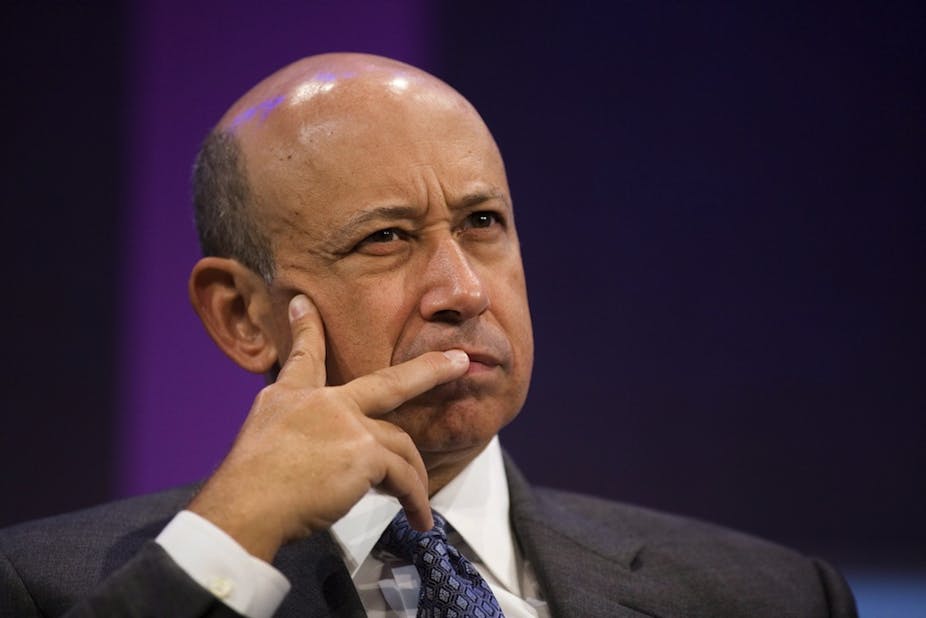Financial regulators must be excited at the thought that God is making himself available to help them. Well, the next best thing. Lloyd Blankfein who once claimed that bankers were “doing God’s work”, has suggested that these agents of the Almighty are ready to help write the laws needed to keep the financial sector in check.
The legendary head of Goldman Sachs was in Sydney on Friday, where he told a business forum that bankers should assist the government to design regulations that govern the financial system.
“People seem to decry the lobbying of banks … [but] we have the right, of course, and the knowledge to make forecasts of what the consequences of these things will be. I don’t think we have just the right, I think we have the obligation [and] the duty, given what we know, to advise: ‘look, if you do this this will be the consequence you might not like the result’.”
So should we put our trust in the divine providence of Mr Blankfein? Perhaps this is a moment to reflect on the advice he offered in the wake of the global financial crisis.
Rather than attributing it to the folly of bankers, it was a hurricane nobody could have predicted, as he told the Financial Crisis Inquiry Commission on 3 January, 2010. “We should resist a response, however, that is solely designed around protecting us from the 100-year storm,” he cautioned. So the global financial crisis was just a rare mishap, an Act of God, and presumably lawmakers should place their trust in markets to regulate themselves.
The real story of the global financial crisis was one of excessive risk-taking, greed and a casual disregard for the law, with fines treated as a cost of doing business. There was none more aggressive than Goldman Sachs, which Rolling Stone journalist Matt Tiabbi, called “a great vampire squid wrapped around the face of humanity, relentlessly jamming its blood funnel into anything that smells like money”.
In 2008, when the financial crisis threatened the company, Goldman Sachs shamelessly asked the New York Federal Reserve to change its legal status from that of investment bank to bank holding company, enabling it to qualify for a government bailout.
Since the crisis, Goldman Sachs has enjoyed healthy profits. It owes its success to returning to the risk-taking that preceded the meltdown, and equally to its ability to deploy expensive lobbyists, whose job it is to cripple regulations that it doesn’t like. And when, on rare occasions, politicians pass a law that it doesn’t like, it employs clever (and no less expensive) lawyers to find loopholes they can exploit.
Goldman Sachs is perhaps the most aggressive, but it is not alone in attacking regulations designed to protect the public from having to bail out banks, should their risk taking once again threaten the financial system.
Banking lobbyists are not only active in the US, but also in Europe and Australia. Their success, suggests former chief economist for the IMF, Simon Johnson, has resulted in a “silent coup”. He concludes that lobbyists have used “their influence to prevent precisely the sorts of reforms that are needed, and fast, to pull the economy out of its nosedive”.
It has been argued that lobbyists are part of the democratic system, and that bankers have every right to express their views on legislation that may affect them. It is not that simple.
Discussions with corporate lobbyists are held behind closed doors, so it is not possible to know what facts and arguments are being presented to politicians and therefore to challenge what they say. In addition, banks are generous contributors to political parties and so their voices are heard much more loudly than those of ordinary taxpayers, who are often lumbered with bailouts when bankers get it wrong.
Rather than look to divine intervention from the likes of Mr Blankfein, perhaps we should look to the gospel of someone who understood the market all too well.
The proposal of any new law or regulation of commerce which comes from [merchants and master manufacturers] … ought always to be listened to with great precaution, and ought never to be adopted till after having been long and carefully examined, not only with the most scrupulous, but with the most suspicious attention.
It comes from an order of men whose interest is never exactly the same with that of the public, who have generally an interest to deceive and even to oppress the public, and who accordingly have, upon many occasions, both deceived and oppressed it.
The quote is from The Wealth of Nations and perhaps it is time to listen to Adam Smith, who evidently did not believe in the divine right of bankers to influence lawmakers.

